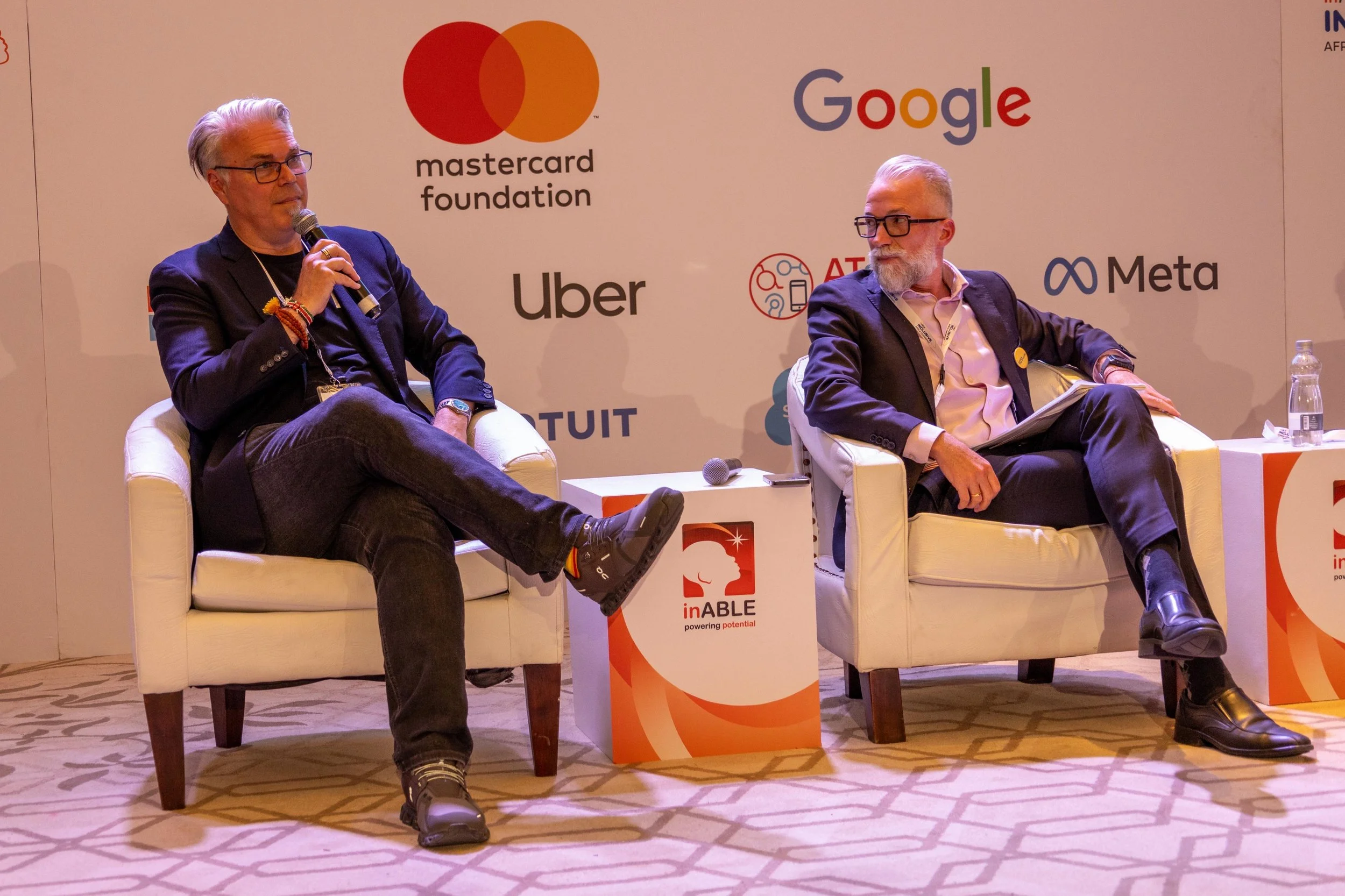Pascal Bijleveld, CEO of ATscale, with Chris Patnoe of Google, during a panel at the Inclusive Africa Conference 2025, discussing strategies to scale affordable, inclusive assistive technology across Africa.
Photo: GDI Hub/Harrison Kamau
At the 6th Inclusive Africa Conference, held on 3 - 5 June 32025 in Nairobi, Kenya, leaders from across the continent convened under the theme “Scaling Digital Accessibility through Innovation & Entrepreneurship”—rallying to harness innovation-driven solutions for disability inclusion.
Inclusive Africa 2025, hosted by inABLE, drew over 465 in-person attendees and 2,000 virtual participants, across Africa. The conference stands as Africa’s leading forum on digital accessibility and disability inclusion—bringing together policymakers, technology leaders, and disability rights advocates. ATscale played a key role as a partner and co-sponsor of the event
In a highlight moment, Pascal Bijleveld, CEO of ATscale, sat down with Irene Mbari-Kirika, Founder and Executive Director of inABLE, for a powerful exchange as part of their ‘Fireside Chat’ series where Pascal explained the mission of ATscale to address the stark global gap in assistive technology access: nearly 90% of those in high-income countries who need AT can get it—compared to just 10% in low-income countries. The interview provides valuable insights for policymakers, development partners, and advocates looking to strengthen national systems for assistive technology access and implementation.
Watch the fireside Chat between Irene and Pascal
“AT is not just for persons with disabilities — it’s also for the ageing, for children needing glasses… it touches every corner of society,” Pascal emphasized, underlining the inclusive reach of AT.
“Invest in everyone, but start with the most vulnerable. If you can reach them, you can reach everyone. That’s the smartest investment you can make,” he challenged policymakers and partners.
Today, ATscale is expanding programmes for children with hearing and vision impairments, forging new collaborations with GDI Hub, UNICEF, and IFC—and deepening its presence in Ethiopia, Nigeria, and Tanzania, while continuing its vital work in Kenya, Rwanda, and Senegal, building upon early efforts in Zambia.
In his keynote address, Pascal urged leaders to think beyond short-term fixes and instead design sustainable, locally relevant AT ecosystems. He outlined ATscale’s strategy to sustainably reach 500 million people, ensuring continuity after donor funding ends. He also called for greater political will, stronger public–private partnerships, and user-led innovation that places the lived experiences of persons with disabilities at the heart of design.
Sustaining innovation across sectors
During the conference, ATscale led a very well-attended interactive session, entitled, Sustaining Disability Innovation: Affordability, Market Access, and Investment in Assistive Technology for all in Africa which brought together innovators, assistive technology (AT) users, policymakers, donors, and disability advocates to discuss how Africa can build truly sustainable ecosystems for assistive technology.
During the session, Irene Mbari-Kirika stated, “Importing non-adaptive devices like wheelchairs unsuited for African terrain won’t work. We must innovate locally, sustainably, and meaningfully.”
The message was clear: scaling AT is both a moral necessity and an economic opportunity. It demands a concerted collaboration among innovators, governments, and financiers to drive inclusive economic growth across Africa.
To drive action, inABLE announced that quarterly forums will be convened to help maintain momentum, address challenges, and connect innovators, policymakers, and users across borders.
Evidence for change: The Smartphone Study
Two sessions — one led by Google and another by GDI Hub — explored findings from the landmark smartphone accessibility study. The research provided critical evidence on how mobile technology can serve as a powerful assistive technology, unlocking communication, education, and economic opportunities for millions. Insights from these sessions are expected to guide product design, policymaking, and market strategies to ensure smartphones become universally accessible.
Celebrating World Day for Assistive Technology
Mumsie Odirile at the Inclusive Africa Conference 2025 joins the #MeAndMyAT challenge, celebrating World Day for Assistive Technology.
Mumsie Odirile at the Inclusive Africa Conference 2025 joins the #MeAndMyAT challenge, celebrating World Day for Assistive Technology.
The conference provided a unique opportunity to mark the 2nd World Day for Assistive Technology on 4 June. Attendees joined the #MeAndMyAT challenge, sharing stories, photos, and videos of the assistive technology that help them to participate fully in everyday life.
“On World Assistive Technology Day, I’m grateful for my wheelchair. It is more than a mobility aid…it’s my key to independence, and everyday life. Technology like this doesn’t just support movement…it supports dreams, goals, and living fully. My chair is what helps me #UnlockTheEveryday.” said Mumsie Odirile, an actress and disability advocate, who participated in the conference.
The activity created a vibrant, personal connection between participants, sparking conversations around how AT supports independence, access to education, and work — and building solidarity across borders. Read more about World Day for Assistive Technology 2025.

